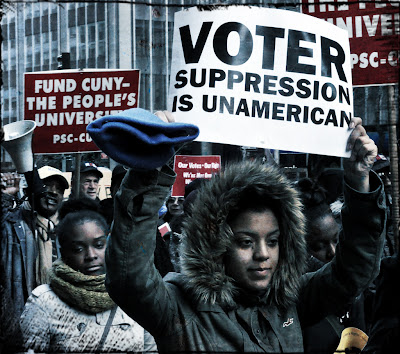
Take a moment and consider how unlikely this headline would be:
WEALTHY WHITE VOTERS FORCED TO STAND IN LINES FOR HOURS TO VOTE.
Doesn't seem like much of a danger, does it? And that tells you all you need to know about the continuing necessity of the Voting Rights Act, currently under attack by the right and the conservative members of the Supreme Court. America has moved on, they argue. There is no polling place discrimination anymore. Racism has been solved.
Yet in Florida, early voting lines were hours long in many places. And for many, early voting isn't a luxury, it's a necessity. Contrary to conservative rhetoric, minority voters work. And most workers don't get to set their own hours. Being able to vote when they have the time off is the only way they can vote. The
crooked Governor of Florida, Rick Scott, refused to reverse changes he'd made to election rules and, when told of the long lines, tried to spin it as the consequence of a vibrant democracy; "People are getting out to vote,"
he said. "That's what's very good."
People having to wait hours to vote is not "what's very good," it's what's very bad. And -- surprise! -- my headline about the travails faced by the intrepid with rich fella doesn't apply here. Reality is pretty much the opposite case.





